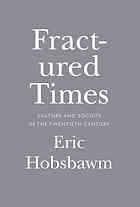
Fractured Times
Culture and Society in the Twentieth Century
کتاب های مرتبط
- اطلاعات
- نقد و بررسی
- دیدگاه کاربران
نقد و بررسی

January 13, 2014
“What happened to the art and culture of bourgeois society” In this posthumous collection of lectures, fugitive pieces, and reflections written between 1996 and 2010, the prolific Marxist social and cultural historian and polymath Hobsbawm (1917–2012), author of The Age of Revolution, explores that question in the expected places (classics in music, opera, ballet, drama, and modern literature) and some unexpected ones: the changing nature of public festivals; the cultural “impact of Jews on the rest of humanity”; the “rise of politicized religion”; and the “invented cowboy tradition.” Along the way, Hobsbawm pays tribute to Karl Kraus’s The Last Days of Mankind, Richard Overbury’s The Morbid Age, and, using the book review as occasion, Hobsbawm sketches biographies of scientist J. D. Bernal and historian Joseph Needham. There’s a short answer to the question posed—technical progress and mass demand are the culprits in a vanishing society that never recovered after WWI—but Hobsbawm’s essays fascinate as they explore the impact of technological obsolescence and technological triumph (“But the new Pentecostal converts do not shy away from the world of Google and the iPhone: they flourish in it.”), among other subjects. Together with increased mobility, expanded literacy, mass demand, and globalization, bourgeois civilization “belongs to a past that is not likely to return.” Hobsbawm writes that “o class of people is enthusiastic about writing its own obituary.” This is its challenging, but often illuminating autopsy.

Starred review from March 15, 2014
The last writings of an eminent British historian. Hobsbawm (How to Change the World: Tales of Marx and Marxism, 2011, etc.), who died in 2012, gathers 22 essays that represent his deep and wide historical interests: 19th-century European culture, the role of the public intellectual, and the relationship of art to science, revolution and power. Selections include book reviews, journal articles and lectures, half previously unpublished. Hobsbawm characterizes the present as intellectually shattered: "an era of history that has lost its bearing, and which in the early years of the new millennium looks forward...guideless and mapless, to an unrecognizable future." Science, religion and the arts, he contends, have lost their cultural force, and the current distrust of science marks a vast change from the 19th-century belief that it "held up the temple of progress." The author champions such influential thinkers as chemist J.D. Bernal, author of The Social Function of Science (1939), and biochemist Joseph Needham, author of a groundbreaking history of Chinese science; both men aimed to affect "changing relations...between science and society." Hobsbawm sees a "major cause for alarm" in the "rise of radical but predominantly right-wing ideologies" within Protestant Christianity and Islam. Fundamentalist movements are concerned not with fostering community but with "powerful, individual spiritual experiences." The arts, he writes, no longer "function as measures of good and bad, as carriers of value: of truth, beauty and catharsis," but instead have become merely consumer items for personal satisfaction. "Who can tell," he asks, "on what terms reason and revived anti-reason will coexist in the ongoing earthquakes and tsunamis of the twenty-first century?" Global movements toward widespread suffrage and representative governments, he asserts, are undermined by weak leadership and uninformed, thoughtless voters. Hobsbawm speaks to the crucial need for engaged public intellectuals and the kind of rigorous social and political analysis so well represented by these urgent and important essays.
COPYRIGHT(2014) Kirkus Reviews, ALL RIGHTS RESERVED.

March 15, 2014
By the time of his death, in 2012, Hobsbawm was one of a small handful of serious historians to enjoy worldwide recognition, even celebrity. That he was a lifelong committed Marxist in a world that by his later years had largely come to reject Marxism in its more overt forms did not diminishand may even have amplifiedhis renown. Yet in the end, he will likely be remembered not for his politics but for the breadth of his knowledge and the suppleness of his arguments. Both are on ample display in this selection, which collects a variety of speeches, essays, and book reviews from late in Hobsbawm's career. For the most part, they address the twentieth century and the various forms of fragmentation and failure that it dealt to the artistic and intellectual ideals of high culture. His erudition is on particularly robust display in pieces on the social function of the work of scientists Joseph Needham and John Desmond Bernal, for example, and in a succinct dissection of his fellow Viennese thinker Karl Kraus. An essay on the myth of the American cowboy also asks serious questions about the cultural significance of animal herders in Western culture. Despite some flat moments when Hobsbawm turns from the past to speculate about the future, this is a pithy and varied collection that Hobsbawm's many fans will appreciate.(Reprinted with permission of Booklist, copyright 2014, American Library Association.)

























دیدگاه کاربران